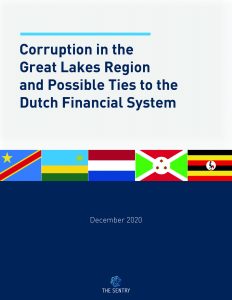Read the full briefing, including an analysis of corporate data, case studies, summary of risk factors, and recommendations.
In order to evaluate and address illicit finance risks, the Dutch Ministry of Foreign Affairs commissioned The Sentry to examine potential connections between corruption in Africa’s Great Lakes region—most notably in the Democratic Republic of Congo (DRC)—and the financial system of the Netherlands. The Sentry conducted a baseline assessment using corporate registration data, regional corruption case studies, and standard indicators of money laundering risk. In analyzing this data, The Sentry identified dozens of connections between politically exposed persons (PEPs) in the Great Lakes and Dutch nationals and companies,* as well as numerous risk factors for money laundering and corruption. While the Dutch tax and investment structure allows legitimate international business to thrive, nefarious actors looking to loot African countries can also use this same structure and its inherent advantages.
Connections Between the Great Lakes and the Netherlands
Burundi, the DRC, Kenya, Malawi, Rwanda, Tanzania, and Uganda collectively form the African Great Lakes region. Foreign direct investment to the region is rising. Uganda saw its biggest yearly increase of foreign direct investment on record in 2018, while the DRC experienced an 11% jump to $1.5 billion. Extractive investments accounted for the bulk of these increases.*
In 2019, the Netherlands held the second largest foreign investment stock in Africa after France, although more than two thirds of those investments were in Egypt, Nigeria, and South Africa.* Exports from the Netherlands to the DRC specifically have increased from €77 million ($91 million) in 2016 to €277 million ($328 million) in 2019, although imports from the DRC to the Netherlands stood at just €23 million ($27 million) in 2019.* This general upward trend in investment and trade increases financial flows between the Netherlands and the Great Lakes, and, with them, the Dutch financial system’s potential exposure to illicit activity.
Historically, the wide array of attractive Dutch tax and investment treaties have made the Netherlands a prime destination for multinational and extractive industries companies to set up their headquarters. The Netherlands has bilateral treaties with developing countries that protect investments by Netherlands-based companies there, thus offering powerful investment guarantees. As corrupt actors operating in the Great Lakes incorporate their business interests in the Netherlands, the Dutch financial system is left exposed. Using shell and holding companies, as well as complex corporate structures, these actors—who could hold bearer shares until recently—appear to be funneling corrupt proceeds through the Dutch financial system and avoiding taxation. Holders of bearer shares, which grant ownership rights without registration, now have until January 2021 to hand in their shares and register as beneficial owners or shareholders.
Case Studies and Recommendations
The Sentry compiled five case studies that demonstrate potentially corrupt ties between corporate entities in the Netherlands and the DRC. Two case studies focus on the corporate holdings of foreign nationals who are members of a high-level Congolese public official’s inner circle and who have extensive business networks across Europe and the Middle East. The other three case studies focus on major international companies that operate in the DRC and have large corporate structures in the Netherlands.
In order to identify, disrupt, and prevent abuse of the Dutch financial and corporate system by corrupt actors, The Sentry recommends specific actions for Dutch banks and government authorities.
 Download the briefing.
Download the briefing.

